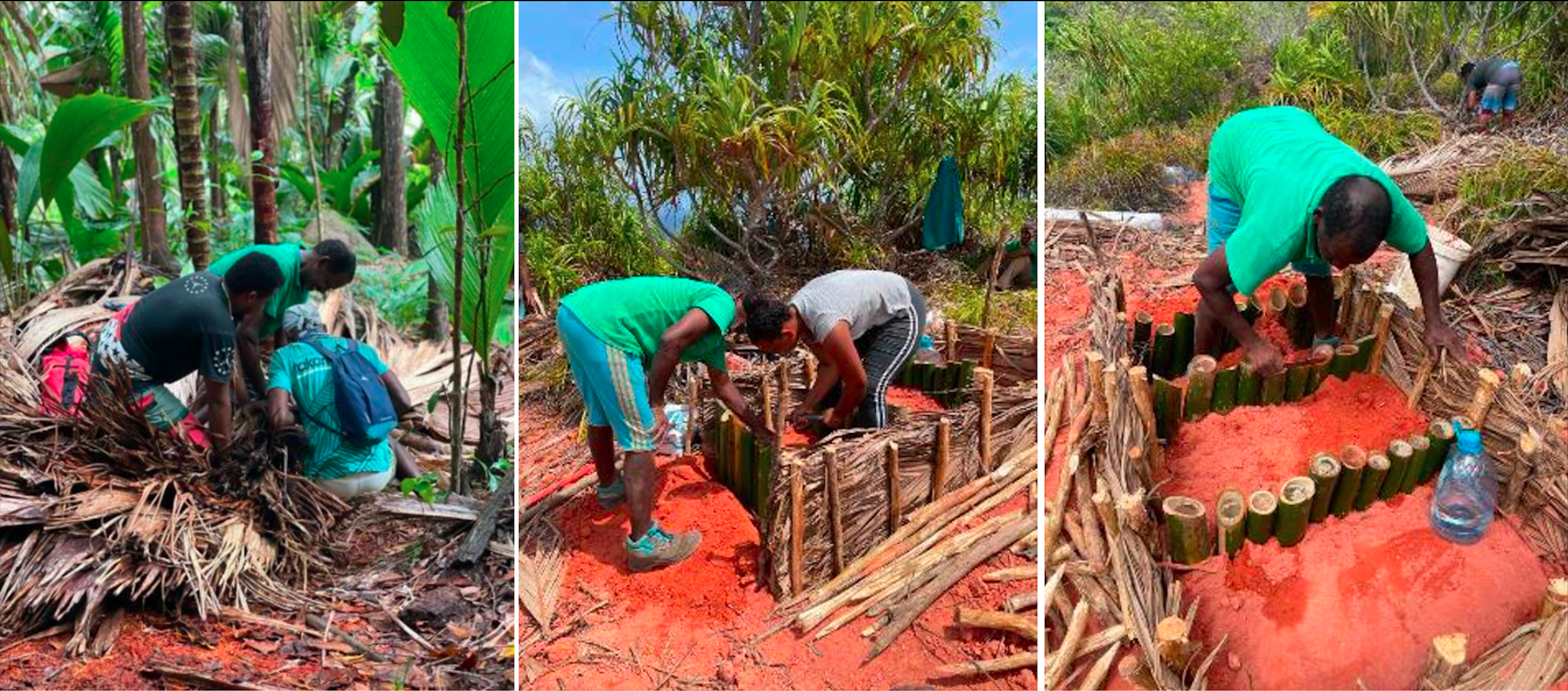An experiment to use dried leaves to curb soil erosion in Seychelles
November 8, 2022

Petite Anse Kerlan, Praslin.
Praslin is the second largest island (38.5 km2) of Seychelles, lying 44 km northeast of Mahé and having a small population of around 7,500 people. Hill-slopes are frequent on the island and, consequently, soil erosion is prevalent there. This topography also exists in Rodrigues and in some parts of Mauritius.
On 5 December 2019, on the occasion of the World Soil Day, the Food and Agriculture Organization (FAO) proclaimed that soil erosion must be stopped to save our future. Soil can rightly be considered as a treasure which hosts a quarter of the planet’s biodiversity and provides about 95% of the food that human societies consume. According to the FAO, soil erosion affects soil health and productivity, decreases agricultural productivity, degrades ecosystem functions and amplifies hydrogeological risk, such as landslides or floods. It can also cause significant losses in biodiversity.
Since the COVID-19 pandemic, the importance of soil has become even more obvious across the islands as the cultivation of vegetables and fruits has proved an essential component for food security. With the war in Ukraine and the disruptions in food provisioning happening worldwide, it is absolutely crucial for soils to be preserved to ensure the availability of fruits and vegetables.

Experimenting on a solution to prevent soil erosion
The UNDP Mauritius and Seychelles Accelerator Lab has engaged conversations with the Terrestrial Restoration Action Society Seychelles (TRASS), a local NGO which aims at replanting trees in areas affected by soil erosion and forest fires, and ensures that 15,000 endemic plants are planted every year.
In the scope of its activities, TRASS has recently come with the idea of using dried palm leaves as natural protective barriers to curb soil erosion on the slopes of Praslin. Through a collaboration with the UNDP Mauritius and Seychelles Accelerator Lab and the Seychelles Parks and Gardens Authority (SPGA), the NGO will now participate in an experiment which could prove valuable not only for Seychelles, but also for Mauritius and Rodrigues.
The experiment
5,000 palm leaves, especially dried “latanier” leaves, were collected by TRASS and the SPGA in the National Park, Fond Boffay Praslin, from 19 to 23 September 2022 for the experiment. Additionally, wooden poles were cut from plant species considered as invasive alien species in Seychelles to be used in the process.
Another requirement for the experiment was to ensure that it could apply to moderately steep and very steep slopes. In this respect, two patches of land with the same kind of soil and level of exposure to rain and sunlight have been identified for each type of slope at Pasquiere and Pointe Chevalier. The setup of the trials started with a training session with TRASS and SPGA staff on the 27 and 29 September.
Setting up of the soil erosion plots
Microplots of 1m x 2m to 2m x 4m are currently being prepared with a catch-pit at the bottom end of the plot, lined with thick black plastic at the bottom to catch the sediment. Palm leaf barriers are being built in one of the two plots for each type of incline and each barrier will be at 1m interval. The second plot will not be protected with dried palm leaves (this is the reference / control plot).
Each plot will be bordered by solid strips of wood or palm leaf to prevent water from getting in from the outside. At the bottom of the plot there will be a catch-pit of 1m width and 0.7-1m deep depending on the site conditions to accommodate sediment during heavy rainfall.
The two plots of land will be left exposed to the weather and regular measurements of soil erosion will be made. The height of the soil from each plot will be measured every month. At the end of the experiment, the soil will be removed, air dried on plastic sheets for 3 days and then weighted. From these measurements, the central hypothesis will be tested.
During the experiment, in addition to palm leaves, other plant materials will be tested such as cocoplum (Chrysobalanus icaco), wild tamarin (Leucaena leucocephala), bamboo (Bambusa sp.), etc.
After the setting up of trials, the patches of land will be monitored during a minimum of two months, depending on whether rain falls abundantly in Praslin or not. After the monitoring, enough data will be available for thorough analysis and reporting.

The Terrestrial Restoration Action Society Seychelles (TRASS), a local NGO which aims at replanting trees in areas affected by soil erosion and forest fires, and ensures that 15,000 endemic plants are planted every year.
What next?
If the experiment works well in Praslin, it would be interesting to replicate it in Rodrigues, which has a similar topography as Praslin. However, the experimentation team will have to manage some dissimilarities as the leaves used in Seychelles may not be available in Rodrigues, where the amount of rain also differs. The experiment could also be extended to some places in Mauritius which are prone to soil erosion.
Seychelles, Mauritius and Rodrigues also suffer from a common beach erosion problem. It might therefore be also useful to identify natural protective barriers for the coastal regions of these islands.
This blog was written with the contributions of Dr Elvina Henriette, Programme Coordinator, (TRASS); Mrs Vicky Athanase, Project Manager, (TRASS); Mrs Jeanna Stravens, Research and Monitoring Officer, (TRASS); Dr Victorin Laboudallon, Founder of Terrestrial Restoration Action Society Seychelles, (TRASS), and Mr. Allen Cedras, Chief Executive Officer at the Seychelles Parks and Gardens Authority (SPGA).
If you’re interested to partner with the UNDP Mauritius and Seychelles Accelerator Lab, please reach out to us at acclab.mu.sey@undp.org

 Locations
Locations